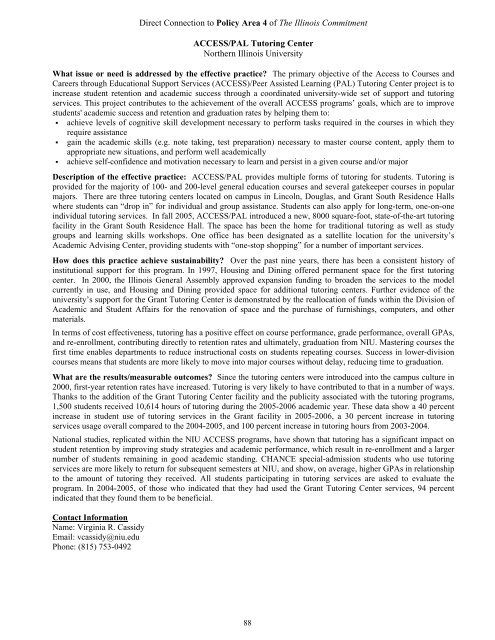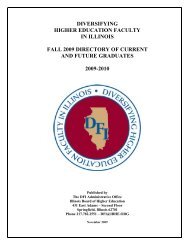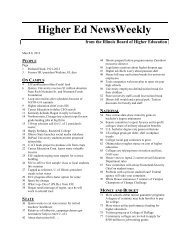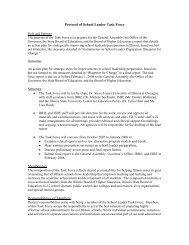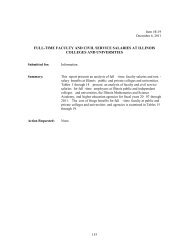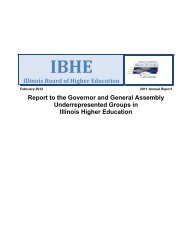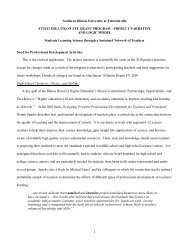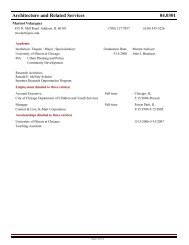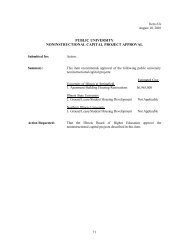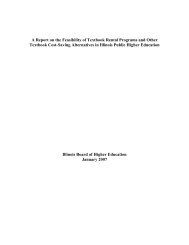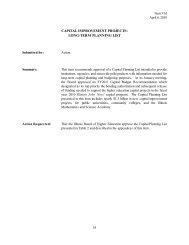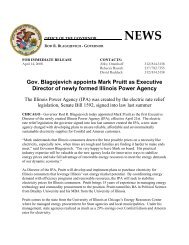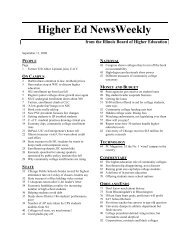Title of Effective Practice: - California Postsecondary Education ...
Title of Effective Practice: - California Postsecondary Education ...
Title of Effective Practice: - California Postsecondary Education ...
Create successful ePaper yourself
Turn your PDF publications into a flip-book with our unique Google optimized e-Paper software.
Direct Connection to Policy Area 4 <strong>of</strong> The Illinois Commitment<br />
ACCESS/PAL Tutoring Center<br />
Northern Illinois University<br />
What issue or need is addressed by the effective practice? The primary objective <strong>of</strong> the Access to Courses and<br />
Careers through <strong>Education</strong>al Support Services (ACCESS)/Peer Assisted Learning (PAL) Tutoring Center project is to<br />
increase student retention and academic success through a coordinated university-wide set <strong>of</strong> support and tutoring<br />
services. This project contributes to the achievement <strong>of</strong> the overall ACCESS programs’ goals, which are to improve<br />
students' academic success and retention and graduation rates by helping them to:<br />
• achieve levels <strong>of</strong> cognitive skill development necessary to perform tasks required in the courses in which they<br />
require assistance<br />
• gain the academic skills (e.g. note taking, test preparation) necessary to master course content, apply them to<br />
appropriate new situations, and perform well academically<br />
• achieve self-confidence and motivation necessary to learn and persist in a given course and/or major<br />
Description <strong>of</strong> the effective practice: ACCESS/PAL provides multiple forms <strong>of</strong> tutoring for students. Tutoring is<br />
provided for the majority <strong>of</strong> 100- and 200-level general education courses and several gatekeeper courses in popular<br />
majors. There are three tutoring centers located on campus in Lincoln, Douglas, and Grant South Residence Halls<br />
where students can “drop in” for individual and group assistance. Students can also apply for long-term, one-on-one<br />
individual tutoring services. In fall 2005, ACCESS/PAL introduced a new, 8000 square-foot, state-<strong>of</strong>-the-art tutoring<br />
facility in the Grant South Residence Hall. The space has been the home for traditional tutoring as well as study<br />
groups and learning skills workshops. One <strong>of</strong>fice has been designated as a satellite location for the university’s<br />
Academic Advising Center, providing students with “one-stop shopping” for a number <strong>of</strong> important services.<br />
How does this practice achieve sustainability? Over the past nine years, there has been a consistent history <strong>of</strong><br />
institutional support for this program. In 1997, Housing and Dining <strong>of</strong>fered permanent space for the first tutoring<br />
center. In 2000, the Illinois General Assembly approved expansion funding to broaden the services to the model<br />
currently in use, and Housing and Dining provided space for additional tutoring centers. Further evidence <strong>of</strong> the<br />
university’s support for the Grant Tutoring Center is demonstrated by the reallocation <strong>of</strong> funds within the Division <strong>of</strong><br />
Academic and Student Affairs for the renovation <strong>of</strong> space and the purchase <strong>of</strong> furnishings, computers, and other<br />
materials.<br />
In terms <strong>of</strong> cost effectiveness, tutoring has a positive effect on course performance, grade performance, overall GPAs,<br />
and re-enrollment, contributing directly to retention rates and ultimately, graduation from NIU. Mastering courses the<br />
first time enables departments to reduce instructional costs on students repeating courses. Success in lower-division<br />
courses means that students are more likely to move into major courses without delay, reducing time to graduation.<br />
What are the results/measurable outcomes? Since the tutoring centers were introduced into the campus culture in<br />
2000, first-year retention rates have increased. Tutoring is very likely to have contributed to that in a number <strong>of</strong> ways.<br />
Thanks to the addition <strong>of</strong> the Grant Tutoring Center facility and the publicity associated with the tutoring programs,<br />
1,500 students received 10,614 hours <strong>of</strong> tutoring during the 2005-2006 academic year. These data show a 40 percent<br />
increase in student use <strong>of</strong> tutoring services in the Grant facility in 2005-2006, a 30 percent increase in tutoring<br />
services usage overall compared to the 2004-2005, and 100 percent increase in tutoring hours from 2003-2004.<br />
National studies, replicated within the NIU ACCESS programs, have shown that tutoring has a significant impact on<br />
student retention by improving study strategies and academic performance, which result in re-enrollment and a larger<br />
number <strong>of</strong> students remaining in good academic standing. CHANCE special-admission students who use tutoring<br />
services are more likely to return for subsequent semesters at NIU, and show, on average, higher GPAs in relationship<br />
to the amount <strong>of</strong> tutoring they received. All students participating in tutoring services are asked to evaluate the<br />
program. In 2004-2005, <strong>of</strong> those who indicated that they had used the Grant Tutoring Center services, 94 percent<br />
indicated that they found them to be beneficial.<br />
Contact Information<br />
Name: Virginia R. Cassidy<br />
Email: vcassidy@niu.edu<br />
Phone: (815) 753-0492<br />
88


